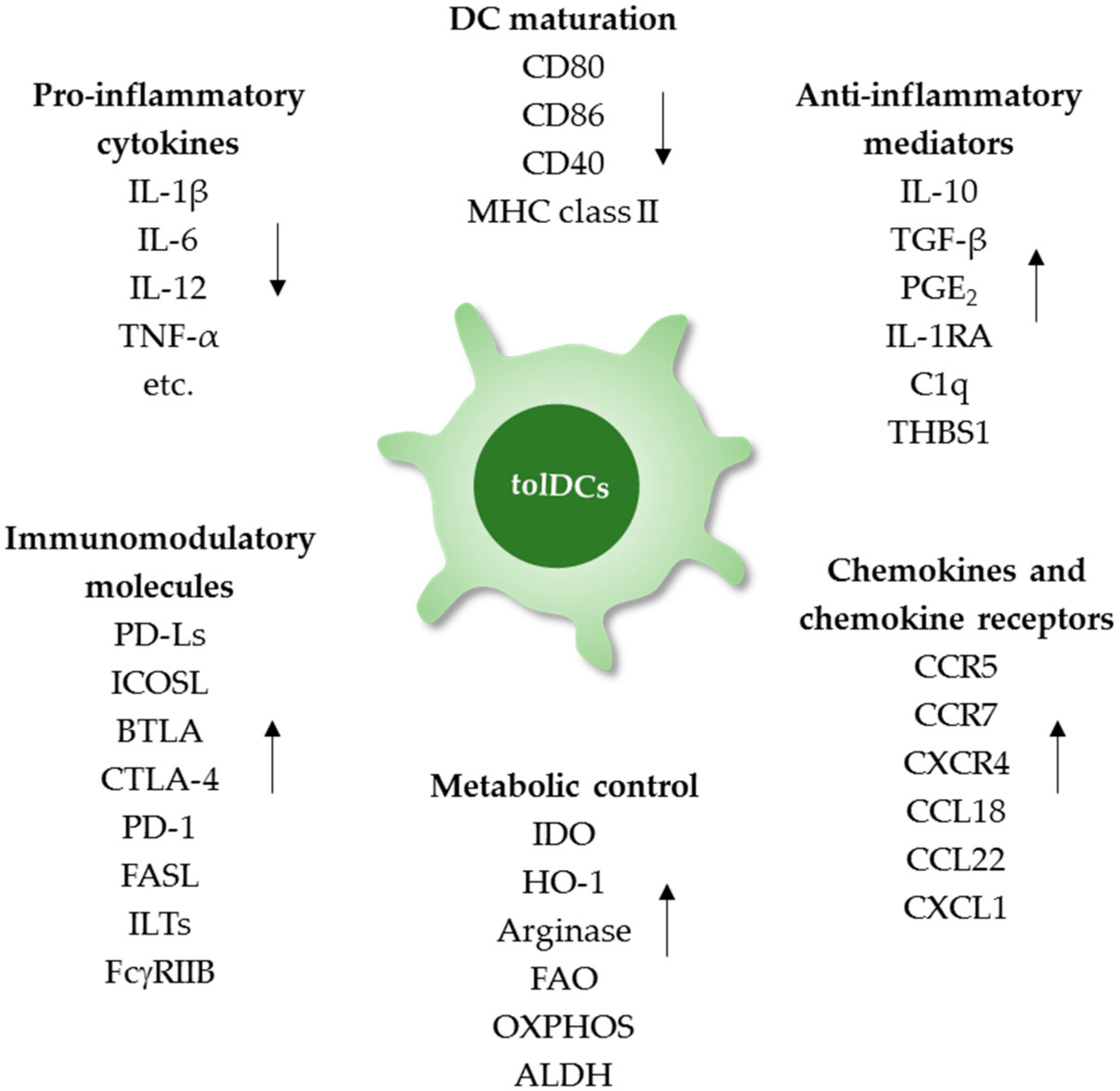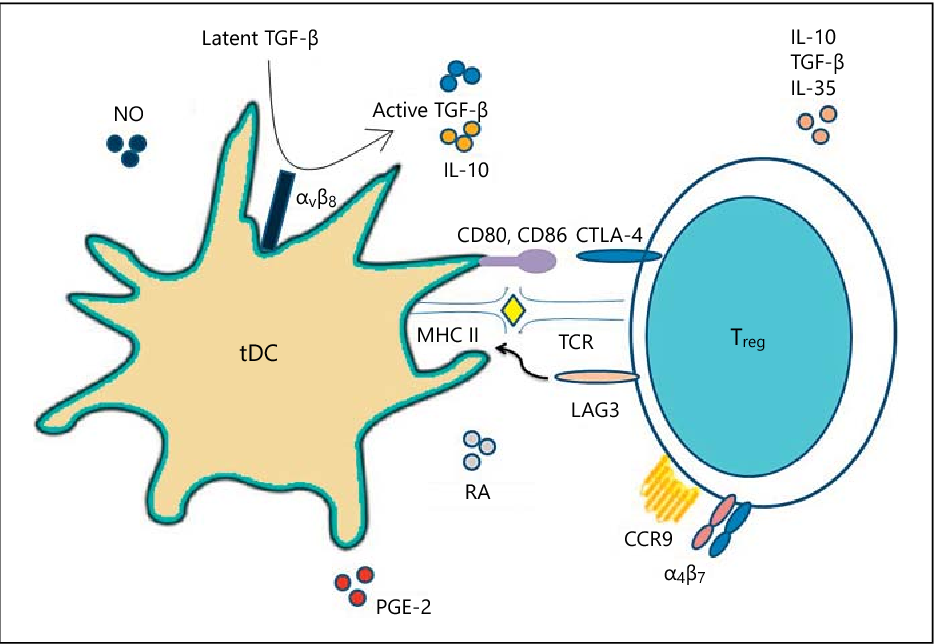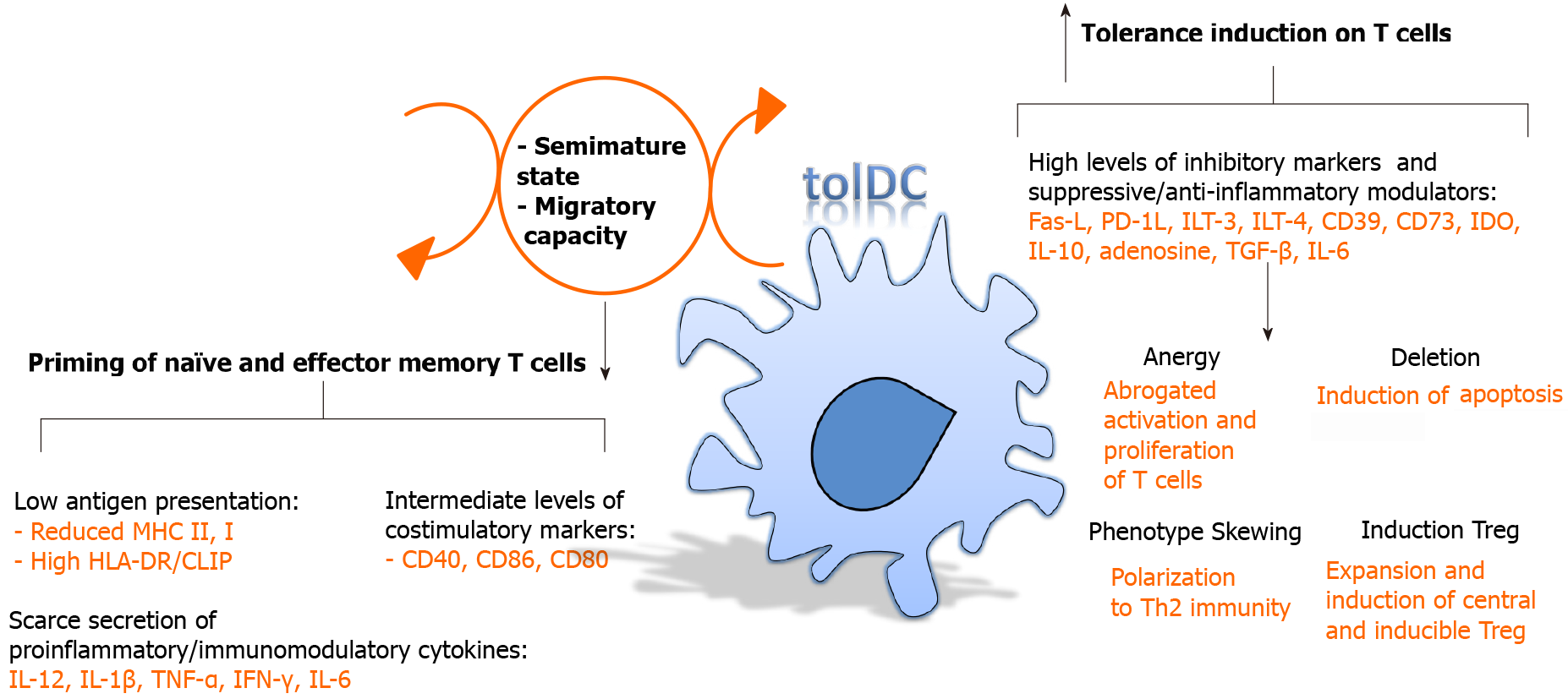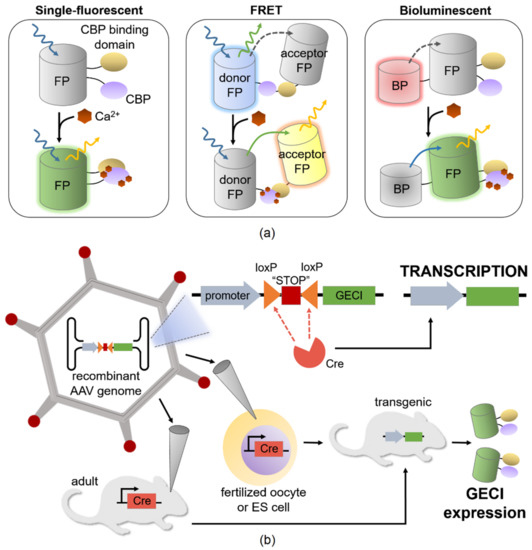Your Tolerogenic dendritic cells images are available in this site. Tolerogenic dendritic cells are a topic that is being searched for and liked by netizens today. You can Get the Tolerogenic dendritic cells files here. Get all free vectors.
If you’re looking for tolerogenic dendritic cells pictures information connected with to the tolerogenic dendritic cells topic, you have pay a visit to the right blog. Our website frequently provides you with suggestions for seeking the maximum quality video and image content, please kindly search and find more enlightening video articles and graphics that match your interests.
Tolerogenic Dendritic Cells. Influence of Dendritic Cells on Regulatory T Cell Formation. Dendritic cells DCs the most efficient antigen-presenting cells are necessary for the effective activation of naïve T cells. 1 Bidirectional interactions between DCs and Ag-experienced T cells initiate either an immunogenic or a tolerogenic pathway and are of crucial importance in autoimmune diseases and in transplantation medicine. Then a maturation stimulus is added and tolDCs are pulsed with.
 Cells Free Full Text Current Paradigms Of Tolerogenic Dendritic Cells And Clinical Implications For Systemic Lupus Erythematosus Html From mdpi.com
Cells Free Full Text Current Paradigms Of Tolerogenic Dendritic Cells And Clinical Implications For Systemic Lupus Erythematosus Html From mdpi.com
In the thymus DCs generate tolerance by. Good Manufacturing Practice Production. 1 Bidirectional interactions between DCs and Ag-experienced T cells initiate either an immunogenic or a tolerogenic pathway and are of crucial importance in autoimmune diseases and in transplantation medicine. Patient leukocytes are collected from blood through leukapheresis and CD14 monocytes MOs are isolated via magnetic cell separation and cultured in the presence of a tolerogenic agent leading to the generation of tolDCs. Dendritic cells DCs are specialized cells of the innate immune system that are characterized by their ability to take up process and present antigens Ag to effector T cells. Then a maturation stimulus is added and tolDCs are pulsed with.
It will be valuable to determine the contribution of DCs or specific DC subsets and stages of maturation to the formation and function of these T cells in vivo.
It will be valuable to determine the contribution of DCs or specific DC subsets and stages of maturation to the formation and function of these T cells in vivo. Abstract Dendritic cells DCs have several functions in innate and adaptive immunity. Dendritic cells DCs are pivotal regulators of the immune response specialized in antigen presentation to drive T cell priming and differentiation. Tolerogenic dendritic cells tDCs represent a promising tool for cellular therapy against autoimmune diseases allergies and transplantation rejection. Tolerogenic Dendritic Cells TolDCs in the Clinic. They are derived from DC precursors produced in the bone marrow.
 Source: sciencedirect.com
Source: sciencedirect.com
Here we investigated whether tolerogenic cells tDCs could interfere with the progression of CCC in an experimental model of Chagas disease. It will be valuable to determine the contribution of DCs or specific DC subsets and stages of maturation to the formation and function of these T cells in vivo. Volume 18 Issue 2. Therefore it is possible that there are two forms of actively tolerogenic T cells that are distinct in their origin and targets. Tolerogenic dendritic cells tol-DCs with immunoregulatory functions have attracted much attention as they play important roles in inducing and maintaining immune tolerance.
 Source: researchgate.net
Source: researchgate.net
ACCEPTED SEPTEMBER 24 2013. It will be valuable to determine the contribution of DCs or specific DC subsets and stages of maturation to the formation and function of these T cells in vivo. Here we investigated whether tolerogenic cells tDCs could interfere with the progression of CCC in an experimental model of Chagas disease. Dendritic cells DCs the most efficient antigen-presenting cells are necessary for the effective activation of naïve T cells. Dendritic cells DCs are highly specialized antigen Ag-presenting cells APCs that integrate a variety of incoming signals and orchestrate the immune response.
 Source: researchgate.net
Source: researchgate.net
Volume 18 Issue 2. In addition there is increasing evidence that DCs in situ induce antigen-specific unresponsiveness or tolerance in central lymphoid organs and in the periphery. 101189jlb0613336 ABSTRACT During the discovery of mechanisms that govern im-. Influence of Dendritic Cells on Regulatory T Cell Formation. Tolerogenic dendritic cells tol-DCs with immunoregulatory functions have attracted much attention as they play important roles in inducing and maintaining immune tolerance.
 Source: semanticscholar.org
Source: semanticscholar.org
Dendritic cells DCs are pivotal regulators of the immune response specialized in antigen presentation to drive T cell priming and differentiation. Dendritic cells DCs the most efficient antigen-presenting cells are necessary for the effective activation of naïve T cells. Tolerogenic dendritic cells tDCs represent a promising tool for cellular therapy against autoimmune diseases allergies and transplantation rejection. Tolerogenic dendritic cells tol-DCs with immunoregulatory functions have attracted much attention as they play important roles in inducing and maintaining immune tolerance. 101189jlb0613336 ABSTRACT During the discovery of mechanisms that govern im-.
 Source: semanticscholar.org
Source: semanticscholar.org
Patient leukocytes are collected from blood through leukapheresis and CD14 monocytes MOs are isolated via magnetic cell separation and cultured in the presence of a tolerogenic agent leading to the generation of tolDCs. As already mentioned a number of TolDCs have been demonstrated as efficient inducers of Tr1 cells with potent immunosuppressive properties namely DC10 or immature DCs in the. They are derived from DC precursors produced in the bone marrow. In addition there is increasing evidence that DCs in situ induce antigen-specific unresponsiveness or tolerance in central lymphoid organs and in the periphery. It will be valuable to determine the contribution of DCs or specific DC subsets and stages of maturation to the formation and function of these T cells in vivo.
 Source: tolerogenics.lu
Source: tolerogenics.lu
It will be valuable to determine the contribution of DCs or specific DC subsets and stages of maturation to the formation and function of these T cells in vivo. Patient leukocytes are collected from blood through leukapheresis and CD14 monocytes MOs are isolated via magnetic cell separation and cultured in the presence of a tolerogenic agent leading to the generation of tolDCs. Dendritic cells DCs are highly specialized antigen Ag-presenting cells APCs that integrate a variety of incoming signals and orchestrate the immune response. Special issue on LUPUS in the AsiaPacific region. DCs can also acquire tolerogenic functions in vivo and in vitro in response to various stimuli including interleukin IL-10 transforming growth factor TGF-β vitamin D3 corticosteroids and rapamycin.
 Source: semanticscholar.org
Source: semanticscholar.org
Special issue on LUPUS in the AsiaPacific region. 1 Bidirectional interactions between DCs and Ag-experienced T cells initiate either an immunogenic or a tolerogenic pathway and are of crucial importance in autoimmune diseases and in transplantation medicine. DCs also have a tolerogenic function participating in the enforcement of central and peripheral tolerance and the resolution of. DCs also have a tolerogenic function participating in the enforcement of central and peripheral tolerance and the resolution of. Influence of Dendritic Cells on Regulatory T Cell Formation.
 Source: researchgate.net
Source: researchgate.net
Special issue on LUPUS in the AsiaPacific region. The use of dendritic cells DCs appears as an option for the development of treatments due to their important role in regulating immune responses. It will be valuable to determine the contribution of DCs or specific DC subsets and stages of maturation to the formation and function of these T cells in vivo. Special issue on LUPUS in the AsiaPacific region. 1 Bidirectional interactions between DCs and Ag-experienced T cells initiate either an immunogenic or a tolerogenic pathway and are of crucial importance in autoimmune diseases and in transplantation medicine.
 Source: jimmunol.org
Source: jimmunol.org
1 Bidirectional interactions between DCs and Ag-experienced T cells initiate either an immunogenic or a tolerogenic pathway and are of crucial importance in autoimmune diseases and in transplantation medicine. Molecular and cellular mechanisms in transplantation Urban Švajger1 and Primož Rožman Blood Transfusion Centre of Slovenia Ljubljana Slovenia RECEIVED JUNE 19 2013. Dendritic cells DCs are pivotal regulators of the immune response specialized in antigen presentation to drive T cell priming and differentiation. REVISED AUGUST 22 2013. The use of dendritic cells DCs appears as an option for the development of treatments due to their important role in regulating immune responses.
 Source: semanticscholar.org
Source: semanticscholar.org
Then a maturation stimulus is added and tolDCs are pulsed with. As already mentioned a number of TolDCs have been demonstrated as efficient inducers of Tr1 cells with potent immunosuppressive properties namely DC10 or immature DCs in the. ACCEPTED SEPTEMBER 24 2013. They are derived from DC precursors produced in the bone marrow. Molecular and cellular mechanisms in transplantation Urban Švajger1 and Primož Rožman Blood Transfusion Centre of Slovenia Ljubljana Slovenia RECEIVED JUNE 19 2013.
 Source: researchgate.net
Source: researchgate.net
It will be valuable to determine the contribution of DCs or specific DC subsets and stages of maturation to the formation and function of these T cells in vivo. Haijing Wu Yi Lo Albert Chan Ka Sin Law Mo Yin Mok Rel Bmodified dendritic cells possess tolerogenic phenotype and functions on lupus splenic lymphocytes in vitro Immunology 101111imm12628 149 1 48-61 2016. Here we investigated whether tolerogenic cells tDCs could interfere with the progression of CCC in an experimental model of Chagas disease. In addition there is increasing evidence that DCs in situ induce antigen-specific unresponsiveness or tolerance in central lymphoid organs and in the periphery. It will be valuable to determine the contribution of DCs or specific DC subsets and stages of maturation to the formation and function of these T cells in vivo.
 Source: mdpi.com
Source: mdpi.com
Dendritic cells DCs the most efficient antigen-presenting cells are necessary for the effective activation of naïve T cells. Haijing Wu Yi Lo Albert Chan Ka Sin Law Mo Yin Mok Rel Bmodified dendritic cells possess tolerogenic phenotype and functions on lupus splenic lymphocytes in vitro Immunology 101111imm12628 149 1 48-61 2016. Abstract Dendritic cells DCs have several functions in innate and adaptive immunity. Influence of Dendritic Cells on Regulatory T Cell Formation. Numerous pharmacological agents are.
 Source: wjgnet.com
Source: wjgnet.com
Dendritic cells DCs are thought to be the most potent antigen-presenting cells which makes a bridge between innate and adaptive immunity. In addition there is increasing evidence that DCs in situ induce antigen-specific unresponsiveness or tolerance in central lymphoid organs and in the periphery. They are derived from DC precursors produced in the bone marrow. Tolerogenic dendritic cells tDCs represent a promising tool for cellular therapy against autoimmune diseases allergies and transplantation rejection. The tolerogenic effects of antigenspecific Tr1 cell therapy were IL10dependent demonstrating a direct involvement of Tr1 cells in the suppressive mechanism.
 Source: researchgate.net
Source: researchgate.net
1 Bidirectional interactions between DCs and Ag-experienced T cells initiate either an immunogenic or a tolerogenic pathway and are of crucial importance in autoimmune diseases and in transplantation medicine. REVISED AUGUST 22 2013. Dendritic cells DCs are highly specialized antigen Ag-presenting cells APCs that integrate a variety of incoming signals and orchestrate the immune response. They are derived from DC precursors produced in the bone marrow. Abstract Dendritic cells DCs have several functions in innate and adaptive immunity.
 Source: jasn.asnjournals.org
Source: jasn.asnjournals.org
Volume 18 Issue 2. Good Manufacturing Practice Production. The tolerogenic effects of antigenspecific Tr1 cell therapy were IL10dependent demonstrating a direct involvement of Tr1 cells in the suppressive mechanism. Dendritic cells DCs the most efficient antigen-presenting cells are necessary for the effective activation of naïve T cells. Dendritic cells DCs are pivotal regulators of the immune response specialized in antigen presentation to drive T cell priming and differentiation.
 Source: researchgate.net
Source: researchgate.net
DCs also have a tolerogenic function participating in the enforcement of central and peripheral tolerance and the resolution of. Then a maturation stimulus is added and tolDCs are pulsed with. Influence of Dendritic Cells on Regulatory T Cell Formation. Dendritic cells DCs the most efficient antigen-presenting cells are necessary for the effective activation of naïve T cells. The use of dendritic cells DCs appears as an option for the development of treatments due to their important role in regulating immune responses.
 Source: researchgate.net
Source: researchgate.net
Dendritic cells DCs are pivotal regulators of the immune response specialized in antigen presentation to drive T cell priming and differentiation. Among their subsets a small portion of DCs with immunoregulatory function was known as tolerogenic DC Tol-DC. Good Manufacturing Practice Production. Then a maturation stimulus is added and tolDCs are pulsed with. Numerous pharmacological agents are.
 Source: sciencedirect.com
Source: sciencedirect.com
As already mentioned a number of TolDCs have been demonstrated as efficient inducers of Tr1 cells with potent immunosuppressive properties namely DC10 or immature DCs in the. Therefore it is possible that there are two forms of actively tolerogenic T cells that are distinct in their origin and targets. Dendritic cells DCs are specialized cells of the innate immune system that are characterized by their ability to take up process and present antigens Ag to effector T cells. Volume 18 Issue 2. Dendritic cells DCs are highly specialized antigen Ag-presenting cells APCs that integrate a variety of incoming signals and orchestrate the immune response.
This site is an open community for users to share their favorite wallpapers on the internet, all images or pictures in this website are for personal wallpaper use only, it is stricly prohibited to use this wallpaper for commercial purposes, if you are the author and find this image is shared without your permission, please kindly raise a DMCA report to Us.
If you find this site good, please support us by sharing this posts to your favorite social media accounts like Facebook, Instagram and so on or you can also save this blog page with the title tolerogenic dendritic cells by using Ctrl + D for devices a laptop with a Windows operating system or Command + D for laptops with an Apple operating system. If you use a smartphone, you can also use the drawer menu of the browser you are using. Whether it’s a Windows, Mac, iOS or Android operating system, you will still be able to bookmark this website.






